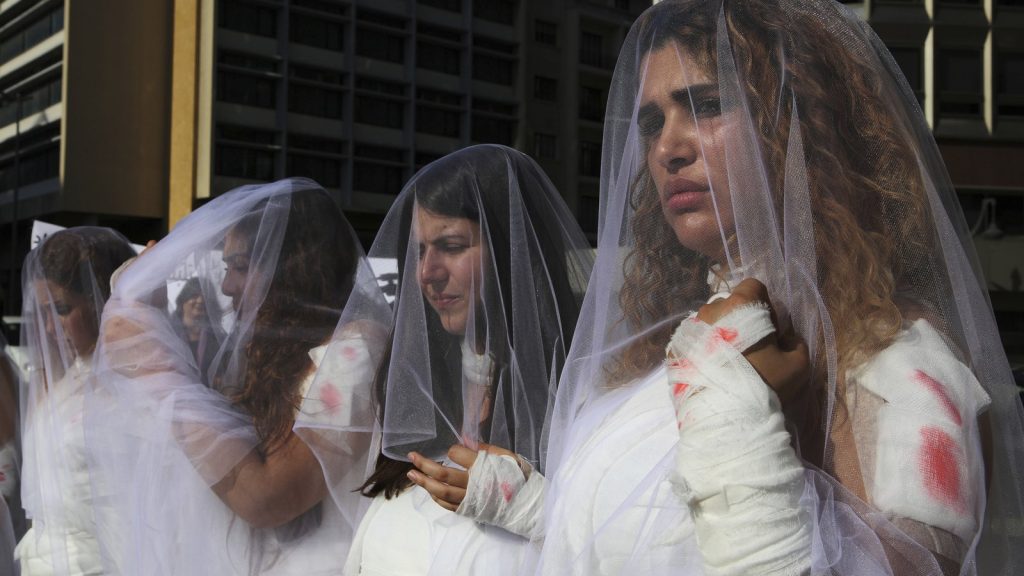
A few years ago, Lebanon was bursting with protests and demonstrations from women’s rights groups against the draconian legal provision (marry-your-rapist law) that allowed rapists to avoid prosecution by marrying their own victims. Women’s rights activists hung ragged wedding dresses outside public buildings and in streets to draw attention to the burning issue. The widespread campaign became officially known as “A White Dress Doesn’t Cover the Rape”, and had the aim of abolishing Article 522 of the Lebanese Penal Code that decriminalized rape on the condition of marrying the victim.
The campaign included widespread mass protests, street protests along with the usage of hashtag #Undress522 and a video of a rape victim with bruises turned into a bride in a white wedding dress. Despite Lebanon ratifying the United Nations Convention on the Elimination of All Forms of Discrimination Against Women (1979) in 1997, the draconian legal provision was in force even a few years ago and was only repealed in 2017 by the Lebanese Parliament after immense national and international pressure.
Sadly, the situation is even grimmer in many other countries. In many countries, rapists are still decriminalized if they offer to marry the rape victim thus putting the victim in mental trauma and forcing to compromise. Hence, ensuring the rape victim justice becomes a sham and the entire judiciary plays the role of a silent spectator of the victim’s trauma.
This article discusses the “Marry-your-Rapist” law from a feminist perspective keeping in mind the feminist jurisprudence, not forgetting the telling effects on the rape victim who is either forced, coerced, or directed by law to marry her rapist.
What is Marry-your-Rapist law?
The marry-your-rapist law, also known as marry-the-rapist law or rape-marriage law is a law or legal provision that consents to a perpetrator who has committed abduction, rape, or any sexual assaults or other similar acts to marry the victim, and subsequently, the rapist is pardoned. The marry-your-rapist law allows the perpetrators to avoid prosecution or punishments by offering to marry the victims.
The practice of rapists marrying the victim has persisted for a long time in many societies. Not only that, the phenomenon has been strengthened with the help of law in some countries. The practice still continues to exist in some societies till now in various forms. With the rising movements highlighting women’s rights, similar laws in many countries were challenged and subsequently repealed. Some laws also authorize the marriage of a pregnant female minor below the age of consent with parental consent which is usually misused by a statutory rapist to avoid prosecution.
The marry-your-rapist law has been justified on the ground of cultural values and significance. But the fate of the victim is hardly highlighted. The law has been repeatedly permitted the perpetrators to avoid the prosecutions or punishments in a legal way. Even after marrying the victim to avoid punishment, there is a vast chance that the rapist may divorce the victim thus pushing her to another ordeal.
These laws are most prominent in the Middle East and North Africa (MENA) region.
Countries that repealed their Marry-your-Rapist laws
The Marry-your-Rapists laws are blatantly discriminating and violence-promoting. Owing to eons of advocacy by women’s rights activists, intellectuals, and policymakers, the Marry-your-Rapist laws are being repealed across the world specifically the Middle East and North Africa (MENA).
To eradicate violence and torture towards women in the name of providing justice by the marriage to rapists, Tunisia, Jordan, and Lebanon repealed the biased laws in 2017 that have, for long, allowed the criminals to skip punishment in a legal way.
- Egypt was the first country to repeal Marry-your-Rapist laws in 1999.
- Morocco repealed Article 475 of the Moroccan Penal Code that exempted rapists from punishments if they marry their rapists in 2014 after a large public outcry took place when a 16-year-old girl named Amina Filali committed suicide by consuming poison when a court-ordered marriage to her rapist.
- Jordan abolished the Marry-your-Rapist laws and repealed Article 308 of the Jordanian Penal Code in 2017.
- In 2017, Lebanon also repealed Article 522 of the Lebanese Penal Code as mentioned earlier.
- Tunisia also repealed Article 227 to end violence against women.
- In 2018, Palestine became the latest country in the Middle East to repeal Marry-your-Rapist laws.
In 2017, the UN Committee on the Elimination of All Forms of Discrimination Against Women (CEDAW) adopted General Recommendation 35, which highlights eliminating gender-based violence against women, which acts as an important international instrument to fight the normalization of rape in legal systems worldwide. CEDAW also called to repeal all legislation that justifies or encourages gender-based violence or discrimination against women. The committee also highlighted to combat societal attitudes that misleadingly “make women responsible for their own safety and for the violence they suffer.”
Countries where the Inhumane Law still prevails

According to a UN report published in 2021, 20 countries in the world still legalizes the phenomenon of Marry-your-Rapist laws. The UN report clearly states that women are subjugated by the use of legal instruments and shifts the feeling of guilt and shame on the victim. The report also mentions that legislation is “deeply wrong” and “a way of subjugating women.”
Russia, Thailand and Venezuela, and other 17 countries mostly situated in the MENA region that still legalizes the marriage of the victim to the rapist. According to Dr. Natalia Kanem, executive director of UNFPA, the body which published the mentioned report, Marry-your-Rapist laws “try to sanitize a situation which is criminal”.
In the countries like Iraq, Bahrain, and Kuwait, the laws still allow a perpetrator to marry the victim with consent from her guardian. In Thailand and Russia, the court exempts the offender from punishment if the perpetrator is above 18 and the girl is a minor i.e., below 18.
Analyzing the Marry-your-Rapist laws through the lens of Indian Legislations
India does not have such a law in its statute books, but given the societal structure, cultural values, and focus on family, marriage to the rapist often takes place owing to immense societal pressure, victim shaming, and in pursuit to save the family honor. The victims are coerced to get married to their rapists by family or society at large. Due to a lack of support and awareness, most of these incidents remain unreported and often do not come before the public eye.
The Indian judiciary has always tried to highlight the importance of delivering justice to women. But there remains a fair chance of “blanket denial” by the victim or her family owing to pressure from various influential quarters or simply giving up due to societal pressure.
In the case of Shyam Narain v. State (NCT of Delhi), the court stated that “Respect for the reputation of women in the society shows the basic civility of a civilized society. No member of society can afford to conceive the idea that he can create a hollow in the honor of a woman.”
In the 2015 case of State Of M.P vs Madanlal, J. Dipak Mishra clearly stated, “in a case of rape or attempt of rape, the conception of compromise under no circumstances can really be thought of.” The court further held that “Sometimes solace is given that the perpetrator of the crime has acceded to enter into wedlock with her which is nothing but putting pressure in an adroit manner.” The court also held the judgments of cases like Baldev Singh and Others v. State of Punjab, Ravindra v. State of Madhya Pradesh, or Shimbhu & Anr vs State Of Haryana which said to have implemented the practice of Marry-your-Rapist phenomenon “have to be confined to the facts of the said cases and are not to be regarded as binding precedents.”
In 2019, a Catholic Christian priest in Kerala named Robin Vadakkumchery was awarded 20 years of rigorous imprisonment by a POCSO Court for raping and impregnating a minor girl, the incident became commonly known as the Kottiyoor rape case of Kerala. During the trial, both he and the survivor’s parents came with the suggestion of marriage which the court rightly rejected. The defrocked priest further moved to Kerala High Court with a petition expressing his desire to marry the victim and to establish parenthood to the child the girl has given birth. But hopefully, Kerala High Court dismissed the plea on the ground of having no merit in 2021 thus establishing a very good precedent and presented a very positive message by upholding women’s rights and dignity.
A new controversy was stirred internationally regarding the application of Marry-your-Rapist laws when in 2021, the news was surfaced in the media that in the case of Mohit Subhash Chavan vs State of Maharashtra, CJI Bobde allegedly posed the question before a 23-year-old man accused of raping a minor girl. CJI Bobde, as quoted by the media, allegedly asked the accused, “If you want to marry, we can help you. If not, you lose your job and go to jail. You seduced the girl, raped her.” Many international, as well as national media sites, openly expressed their shock and anguish after the remark came from the highest court in India (Supreme Court in India). The comments created a large public outcry and the CJI later clarified before the media that he was misquoted and misreported and the Solicitor General Tushar Mehta stated the remarks to be ‘twisted’.
Ending Marry-your-Rapist Law – Why should it be repealed worldwide?

Marry-your-rapist laws are barbaric and insensitive laws that are rooted in extreme patriarchal supremacy and subjugation of women. Continuing these laws means the constant encouragement of subjugating women and treating them as secondary objects. The Marry-your-Rapist laws not only deny justice to the victims but make the existing judiciary a mockery. Not only that, these laws indirectly push the society to destruction as these laws indicate that Rape is a trivial matter and can be bargained or negotiated through talks thus consciously promoting ‘Rape Culture’. But these laws never focus on the fate of the victims. Rather, these laws allow women to be treated as a piece of flesh which can be traded.
Apart from that, the laws perpetuate a feeling of shame and stigma that surrounds the rape victim rather than shaming the perpetrators. This also presents few influential people, especially those who have powers, with the opportunity to exploit the situation. These laws also act against the interest of women’s rights. In the name of preserving “family honor”, these laws traumatize rape victims by forcing or directing them to marry the very person who outraged their modesty and violates the right to justice thus effectively allowing forced marriage and modern slavery through the loopholes of the law.
Laws in many countries also ask for a legal guardian’s consent to get her married in cases of underage victims which is extremely disheartening as it further undermines her agency. Thus, Marry-your-Rapist laws are the perfect egregious example that rob women of their agency.
Another factor that matters is the grey area of the consent of the rape survivor which at times also perplexes the court. It should be kept in mind that consent for marriage is a personal choice, particularly where such a heinous crime, is associated and the option of marriage stems from it. So, the mere consent by the victim or her family should not be highlighted but should be scrutinized by the competent authorities keeping the immense societal pressure in mind. The laws are not supposed to direct the victim to marry her rapist. In rare cases, if the victim is willing, she may take the decision to marry. But giving the perpetrator a chance to evade punishments in a legal way by marrying the victim only to divorce later makes the legal system a mockery.
Conclusion
The constant stigmatization, victim shaming, and societal pressure are the main reasons behind the normalization of rape giving birth to Marry-your-Rapist laws. The women’s rights activists and organizations should keep a close look and interfere when required.
Advocates of Marry-your-Rapist laws claim that the purpose of this law is to safeguard the victims and their families from getting shamed by society. While they not only violate ignore the basic rights of the victim to get justice but also help vehemently propagate the idea that getting raped is a girl’s fault. As a result, there are tendencies from women to brush these brutal incidents under the carpet and continue to leave a life full of self-shame and trauma.
In reality, the Marry-your-Rapist laws devalue women’s individualism. These laws also promote exemption for rape thus normalizing unlawful sexual activities and treating women as an object. The so-called family honor and female chastity clash with women’s right to freedom. These laws are mostly still prevalent in underdeveloped or conservative countries.
The Marry-your-Rapist laws do not women into consideration and remain busy providing the rapists with a legal gateway. The existing legislation legalizing this brutality should be repealed as early as possible to stand up for women’s basic rights so that future generations become free from this type of cruelty and inhumanity.